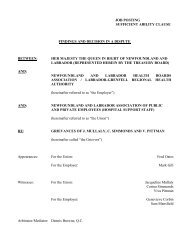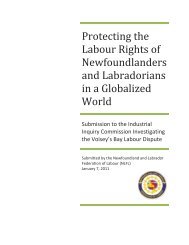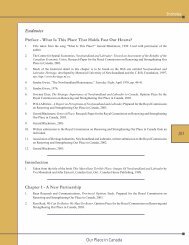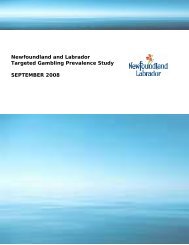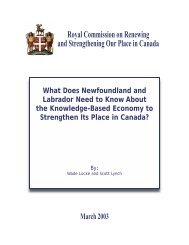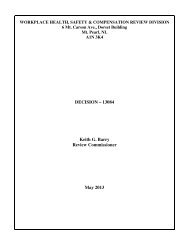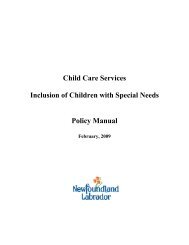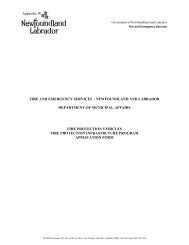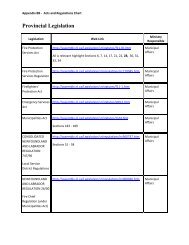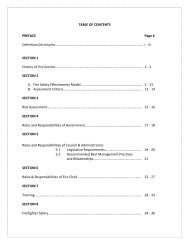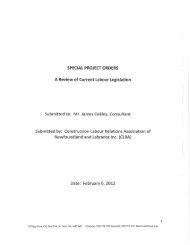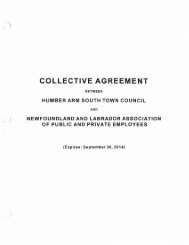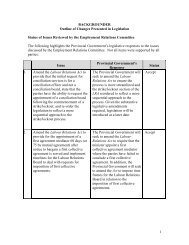Energy Plan - Government of Newfoundland and Labrador
Energy Plan - Government of Newfoundland and Labrador
Energy Plan - Government of Newfoundland and Labrador
You also want an ePaper? Increase the reach of your titles
YUMPU automatically turns print PDFs into web optimized ePapers that Google loves.
Efficiency <strong>and</strong> Conservation Programs<br />
To encourage reductions in energy consumption through conservation <strong>and</strong><br />
increased efficiency, the Provincial <strong>Government</strong> will establish a series <strong>of</strong> targeted<br />
programs, following a focused set <strong>of</strong> consultations. Different energy consumer<br />
categories have very different energy efficiency <strong>and</strong> conservation needs:<br />
Transportation<br />
Because the transportation sector is our largest consumer <strong>of</strong> hydrocarbons,<br />
initiatives in this area <strong>of</strong>fer a significant potential for improvements in energy<br />
efficiency <strong>and</strong> benefits for the environment. However, energy conservation <strong>and</strong><br />
efficiency in transportation is a difficult issue, particularly in jurisdictions like<br />
<strong>Newfoundl<strong>and</strong></strong> <strong>and</strong> <strong>Labrador</strong> with large rural areas. The largest centres in this<br />
province are too small to economically support many forms <strong>of</strong> mass transit,<br />
such as commuter rail systems. As a result, energy conservation <strong>and</strong> efficiency<br />
in this sector depends largely on thous<strong>and</strong>s <strong>of</strong> individual decisions concerning<br />
vehicle purchases, driving habits <strong>and</strong> distance traveled. As an initial step, the<br />
Provincial <strong>Government</strong> will consider the implementation <strong>of</strong> a rebate to encourage<br />
the purchase <strong>of</strong> highly efficient automobiles such as hybrids <strong>and</strong> diesels. The<br />
Provincial <strong>Government</strong> will also investigate additional ways to influence buyers’<br />
choice towards more efficient vehicles, such as sales tax rebates or a scaled<br />
annual license fee for vehicles based on energy efficiency. As a member<br />
<strong>of</strong> the New Engl<strong>and</strong> Governors <strong>and</strong> Eastern Canadian Premiers Conference,<br />
<strong>Newfoundl<strong>and</strong></strong> <strong>and</strong> <strong>Labrador</strong> has committed to investigate the adoption <strong>of</strong><br />
advanced vehicle energy efficiency st<strong>and</strong>ards at the state <strong>and</strong> provincial level.<br />
The transportation sector also includes aircraft, fishing vessels <strong>and</strong> ferries<br />
<strong>and</strong> freight transportation on l<strong>and</strong> <strong>and</strong> water. We will examine best practices in<br />
these parts <strong>of</strong> the transportation sector to encourage greater energy efficiency<br />
<strong>and</strong> conservation. Federal jurisdiction in some parts <strong>of</strong> the sector will require<br />
national policy decisions, but there are ways that we as a province can act to<br />
reduce energy consumption in this sector. Buying more local products, for<br />
example, provides an opportunity to conserve some <strong>of</strong> the energy used in the<br />
freight industry.<br />
The Provincial <strong>Government</strong> will lead by example through a vehicle policy that<br />
Departments “buy what they need,” <strong>and</strong> by adopting an initial target that 25 per<br />
cent <strong>of</strong> all cars <strong>and</strong> SUVs purchased in the next four years will be energy–efficient<br />
vehicles, including, but not limited to, hybrids. This target will be extended to<br />
pickup trucks when the availability <strong>of</strong> hybrids in this class improves.<br />
POLICY<br />
ACTIONS<br />
Efficiency <strong>and</strong> Conservation<br />
Programs<br />
The <strong>Government</strong> <strong>of</strong><br />
<strong>Newfoundl<strong>and</strong></strong> <strong>and</strong> <strong>Labrador</strong> will:<br />
• Consider the implementation<br />
<strong>of</strong> a rebate program to<br />
encourage the purchase <strong>of</strong><br />
hybrids <strong>and</strong> other<br />
fuel–efficient cars <strong>and</strong> SUVs.<br />
• Investigate ways to influence<br />
vehicle choice towards more<br />
efficient vehicles.<br />
• Investigate the adoption <strong>of</strong><br />
advanced vehicle energy<br />
efficiency st<strong>and</strong>ards as<br />
a member <strong>of</strong> the New<br />
Engl<strong>and</strong> Governors <strong>and</strong><br />
Eastern Canadian Premiers<br />
Conference.<br />
• Continue to implement<br />
transportation conservation<br />
initiatives as outlined in the<br />
Climate Change Action <strong>Plan</strong>.<br />
• Develop a program to assist<br />
large industrial operations<br />
to perform efficiency/<br />
conservation audits.<br />
• Explore the introduction <strong>of</strong><br />
commercial <strong>and</strong> residential<br />
lighting conservation <strong>and</strong><br />
insulation enhancement<br />
programs.<br />
(continued)<br />
59



